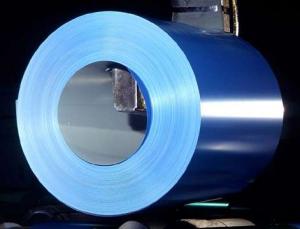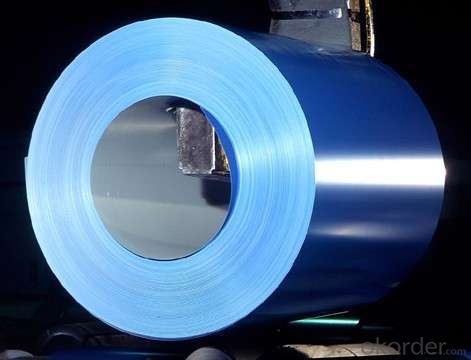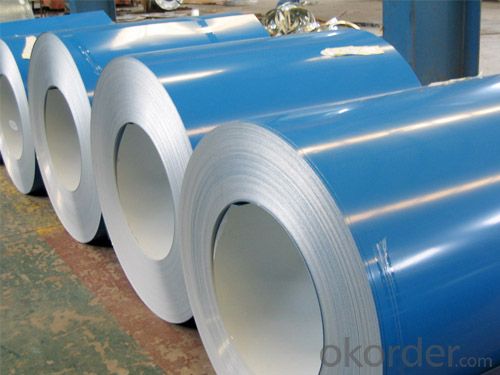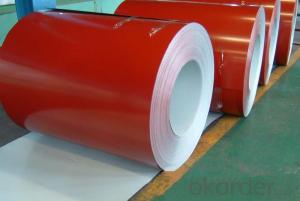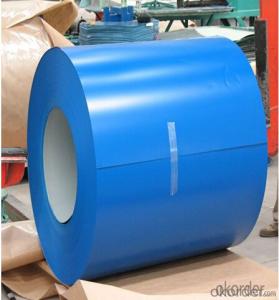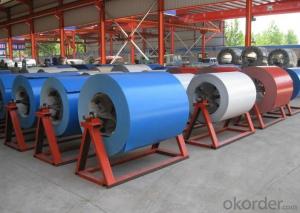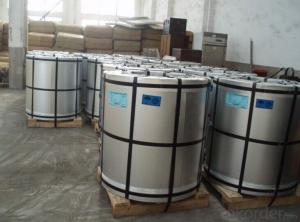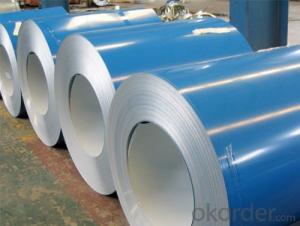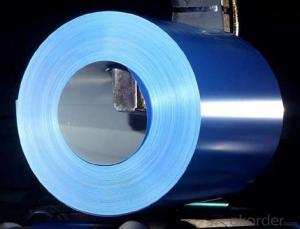Pre-painted Galvanized/Aluzinc Steel Sheet Coil with Prime Quality and Lowest Price in Blue
- Loading Port:
- China Main Port
- Payment Terms:
- TT or LC
- Min Order Qty:
- -
- Supply Capability:
- 10000 m.t/month
OKorder Service Pledge
OKorder Financial Service
You Might Also Like
1.Structure of Pre-painted Galvanized/Aluzinc Steel Coil-Blue Description
With Pre-painted Galvanized/Aluzinc Steel Coil-Blue as base metal, after pretreatment (degrease and chemical treatment) and liquid dope with several layers of color, then after firing and cooling, finally the plate steel is called pre-painted galvanized (aluzinc) steel. Pre-painted Galvanized/Aluzinc Steel Coil-Blue is good capable of decoration, molding, corrosion resistance. It generally displays workability, durability and weather resistance.
2.Main Features of the Pre-painted Galvanized/Aluzinc Steel-Blue Coil
• Excellent corrosion resistance
• Excellent heat resistance performance
• High strength
• Good formability
• Good visual effect
3.Pre-painted Galvanized/Aluzinc Steel Coil Images
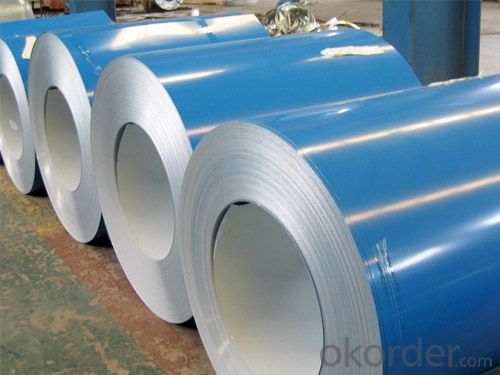
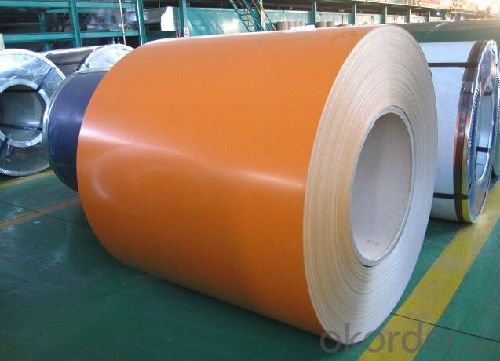
4.Pre-painted Galvanized/Aluzinc Steel Coil- Blue Specification
Quality standar: JIS G3312 CGCC & CGLCC
Width : 914mm, 1000mm, 1220mm and 1250mm, thickness 600-1250mm is available
Finish by coil or sheet: Both sheet and coil are available
8Zinc coating: 60-275G/M2, both sides
Hardness of P: Both soft and hard quality are available
Surface finish: with or without protect film
Thickness : 0.14-1.20 mm
Paint thickness for top side : 5 micron primer + (10-20) microns modified polyester, any RAL color code.
Paint thickness for back side: (5-10) microns Epoxy
Weight per coil: 4-6 tons, also can be upon customer's requirements
Max loading weight in one 20ft container : 25 tons generally
5. FAQ of Pre-painted Galvanized/Aluzinc Steel Coil
We have organized several common questions for our clients,may help you sincerely:
1. What is the minimum order quantity ?
Our MOQ is 50mt for each size. And we will consider to give more discount if you make big order like 1000 tons and more. Further more, the more appropriate payment term your offer the better price we can provide.
- Q: I have good quality knives that I sharpen with various things, but mostly with a fine, diamond encrusted dry stone (eze lap) . When I run them over the steel, it doesn't seem to make any difference. I've heard that it aligns the edge, whatever that means. Using a steel, is it all just for show ?
- It does NOT sharpen a knife, It helps to keep a sharp knife sharp. Once you have sharpened your knife weather on a stone or other ways you should use the steel before using each time to keep it's edge . Think of an athlete who works out to gain muscles(sharpening) and stretches(steel) before using them. The show part is all in the way you use the steel, some just go downward and some go upward, either way you need to change sides of the blade on each stroke just like sharpening.
- Q: I work the Copper plating line at a custom plating facility in MI.I like to use jumper cables with the jumper cable clamps to help confirm electric current is getting to my parts that I am plating. The acids in the Acid copper is constantly eating the steel and copper clamps. WIll I get a good enough current through stainless steel clamps? I use stainless steel hooks, but our maintenance man thinks that is one of the reasons why I have prblems with my parts turning out. I still think it has to do with the clamps getting eatin up. My question is Is stainless steel as good or reliable enough to run an electrical current to my parts if I am using stainless steel or is it best to use another method to try and get a better connection.Please state your sources or experience with working with electricity. I need to get honest answers and not this is my opinion. We are talking about my making a living so this is important to me so I can bring food home to my table. Thanks for all the help.
- Stainless steel is not such a good conductor as copper and the only metal with better conductivity is silver. Additionally, stainless steel will corrode in certain very corrosive environments without the presence of oxygen - i.e. when immersed in salt water. If you're getting problems caused by corrosion of the copper contacts you use there may well be a trade off so my advice is to do a trial and see what works best. You can check the conductivity of metals by simple online search for the period table:
- Q: How are steel coils used in the manufacturing of shipping containers?
- Steel coils are used in the manufacturing of shipping containers as they are rolled into sheets, which are then cut and welded to create the walls, roof, and floor of the container. The high strength and durability of steel coils ensure that the shipping containers can withstand the rigors of transportation, protecting the goods inside.
- Q: What are the different types of steel coil coatings?
- There are several different types of steel coil coatings, including galvanized, galvalume, pre-painted, and organic coatings.
- Q: How are steel coils used in the manufacturing of agricultural silos?
- Steel coils are used in the manufacturing of agricultural silos by being formed and shaped into corrugated sheets, which are then assembled into the walls of the silo. The strength and durability of the steel coils ensure that the silo can withstand the weight of the stored grains and withstand external pressures.
- Q: What is the size range of steel coils?
- The size range of steel coils can vary depending on the specific requirements and applications, but generally, they can range from a few inches to several feet in width and from a few thousand pounds to several tons in weight.
- Q: What are the different steel coil finishes available?
- There are several different steel coil finishes available, including hot rolled, cold rolled, galvanized, and coated finishes.
- Q: help me and my twin love this cutie in our form !? how do we steel hime from bitchey rebecca!? X X X xX
- Please...for the sake of everyone else...grow up and learn how to spell!! The boy you and your twin likes is taken, and you should seriously keep your hands off another girl's boyfriend. Even if you steal him, you'll be fighting over him with your twin. Not worth it. Karma is going to come all the way back around, and kick you hard on the butt and slap you on the face, so you better watch out.
- Q: How are steel coils used in the production of metal bridges?
- Due to their versatility, strength, and durability, steel coils are a crucial element in the manufacturing of metal bridges. These coils, typically made from high-quality steel alloys, provide the necessary structural integrity required for bridge construction. To begin the process of using steel coils for bridge production, they undergo a series of manufacturing techniques. The coils are uncoiled and straightened to eliminate any distortions or bends. They are then precisely cut into lengths according to the specifications of the bridge design. Once the steel coils have been processed, they are transformed into various structural components used in bridge construction. These components include beams, girders, trusses, and plates. Beams and girders serve as the primary support structure of the bridge, while trusses provide additional support and stability. Plates are used for the bridge deck, providing a surface for vehicles and pedestrians to travel on. Steel coils also play a critical role in the fabrication of bridge connections and joints. These connections are essential for transmitting loads and forces throughout the bridge structure, ensuring its stability and safety. Steel coils are utilized in the creation of various connection elements, such as bolts, nuts, washers, and welded sections. Furthermore, steel coils are commonly employed in the production of bridge reinforcements. Rebar, which is used to strengthen concrete elements within the bridge, is manufactured from steel coils. By enhancing the load-bearing capacity and resistance to bending and tension, these reinforcements strengthen columns, piers, and abutments. In addition to their structural applications, steel coils are also utilized for protective coatings on metal bridges. They can be coated with specialized materials like zinc, epoxy, or paint to prevent corrosion and extend the bridge's lifespan. These coatings are especially important in harsh environments with high levels of moisture, chemicals, and weathering factors, as they help maintain the bridge's structural integrity. Overall, steel coils are the foundation of metal bridge production. They are transformed into various components, connections, reinforcements, and protective coatings that ensure the bridge's strength, durability, and longevity.
- Q: What are the different coil winding methods used for steel coils?
- The different coil winding methods used for steel coils include cross-winding, helical winding, and layer winding. Cross-winding involves winding the steel coil in a crisscross pattern to ensure even distribution of the material. Helical winding involves winding the steel coil in a spiral pattern, which provides strength and stability to the coil. Layer winding involves winding the steel coil in layers, with each layer placed on top of the previous one, ensuring efficient use of space and easy unwinding of the coil.
Send your message to us
Pre-painted Galvanized/Aluzinc Steel Sheet Coil with Prime Quality and Lowest Price in Blue
- Loading Port:
- China Main Port
- Payment Terms:
- TT or LC
- Min Order Qty:
- -
- Supply Capability:
- 10000 m.t/month
OKorder Service Pledge
OKorder Financial Service
Similar products
Hot products
Hot Searches
Related keywords
